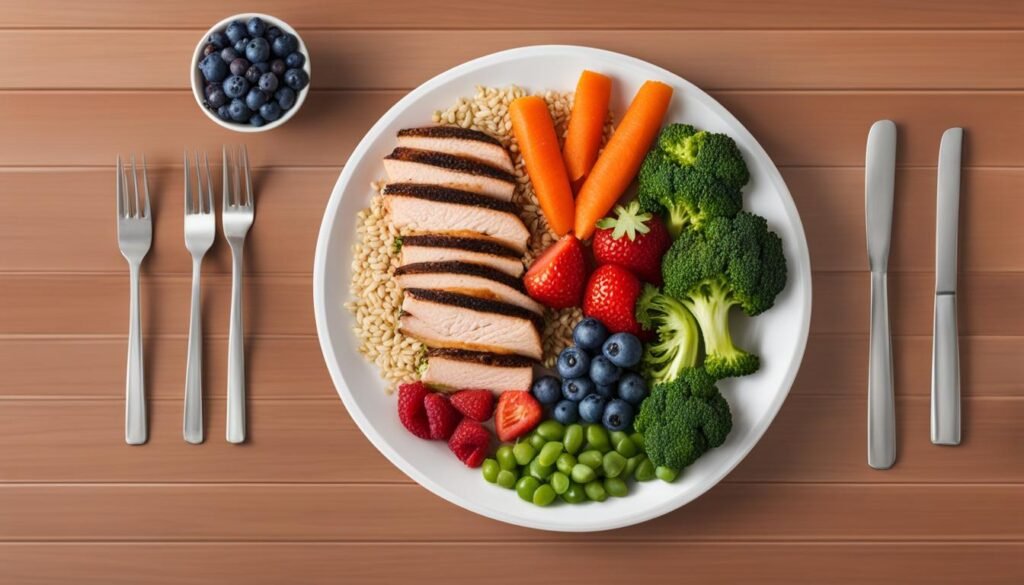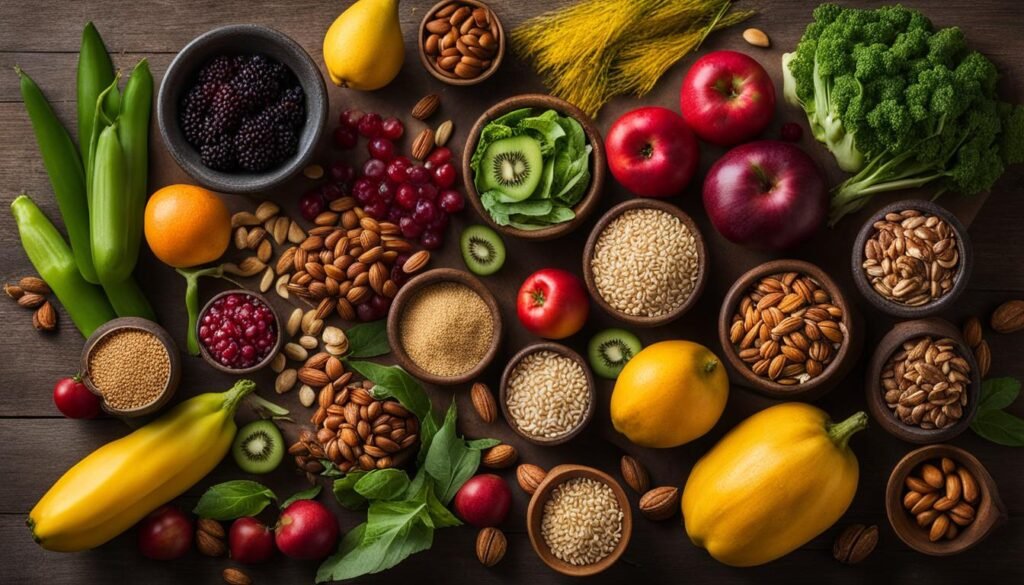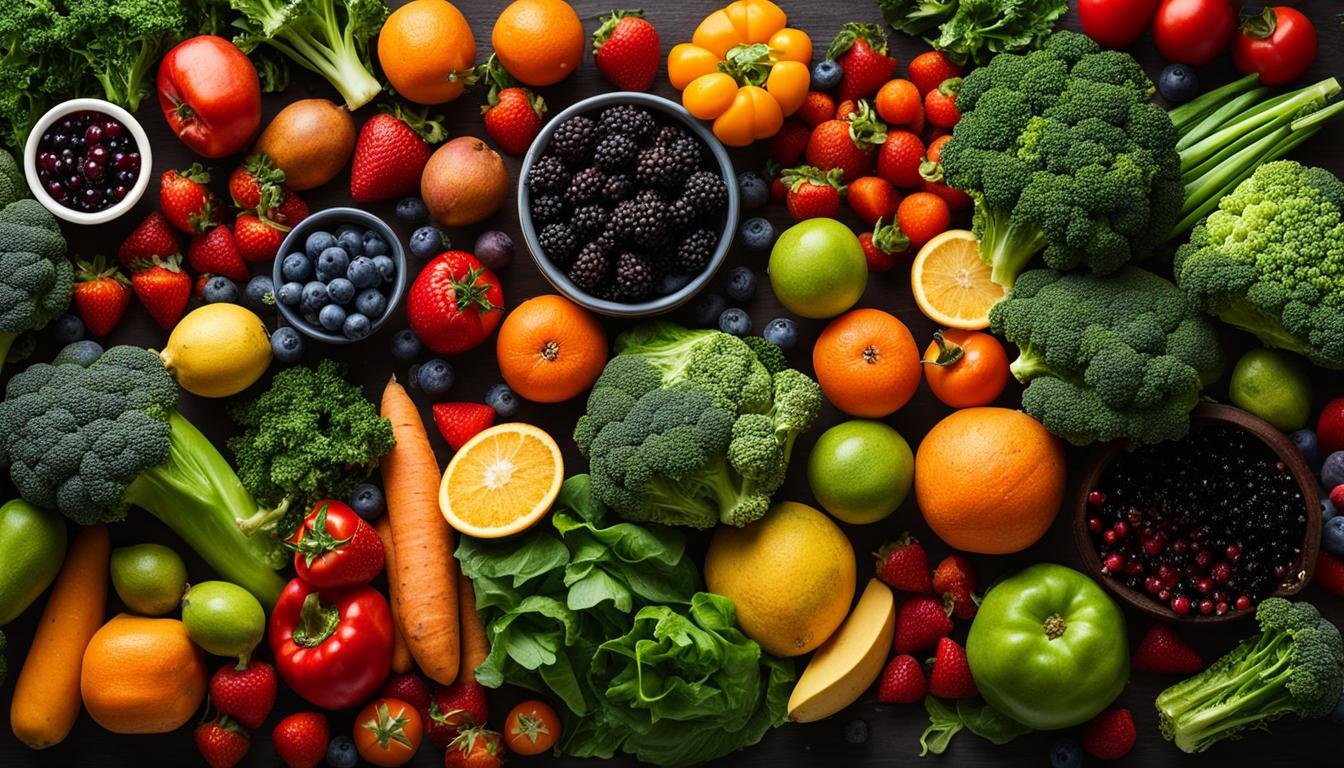Fiber is an essential nutrient that plays a crucial role in our overall health. Not only does it aid in digestion and promote regular bowel movements, but it also helps to regulate blood sugar levels, promote feelings of fullness, and potentially aid in weight loss efforts. But what exactly is fiber, and how can we ensure we are getting enough of it in our diets?
In this article, we will explore the concept of fiber, its role in our diet, and how it impacts body composition changes. We will delve into the different types of fiber, their sources, and provide recommendations on how to incorporate more fiber-rich foods into our meals. By the end of this article, you’ll have a better understanding of the importance of fiber and how it can benefit your overall health and wellness goals.
Key Takeaways:
- Fiber is an important nutrient that supports overall health and wellness.
- There are two main types of fiber: soluble and insoluble.
- Fiber plays a role in weight management, digestive health, and blood sugar control.
- Fiber-rich foods include fruits, vegetables, whole grains, and legumes.
- The recommended daily fiber intake for adults varies based on age, gender, and health goals.
Understanding Fiber
Fiber is an essential component of a healthy diet, yet it is often overlooked. It refers to the indigestible parts of plant foods that pass through our digestive system relatively unchanged.
There are two main types of fiber: soluble and insoluble fiber. Soluble fiber dissolves in water and forms a gel-like substance in the intestines, while insoluble fiber does not dissolve in water and adds bulk to stool.
Dietary Fiber
Dietary fiber is the fiber found naturally in foods. It plays an important role in maintaining digestive health and has numerous health benefits. Soluble fiber can help lower blood cholesterol and glucose levels, while insoluble fiber assists in preventing constipation and promoting regular bowel movements.
Soluble Fiber
Soluble fiber can be found in foods like beans, oatmeal, nuts, and fruits such as apples and blueberries. It has been shown to aid in reducing the risk of heart disease, improving blood sugar control, and promoting feelings of fullness.
Insoluble Fiber
Insoluble fiber is commonly found in vegetables, whole grains, and wheat bran. It helps keep food moving through the digestive system and can assist in preventing digestive issues such as constipation.
| Fiber Type | Food Sources |
|---|---|
| Soluble fiber | Beans, oats, nuts, fruits |
| Insoluble fiber | Vegetables, whole grains, wheat bran |
Fiber is a crucial part of a healthy diet and should not be overlooked. By incorporating a variety of fiber-rich foods into your diet, you can reap the numerous benefits, including maintaining digestive health and improving overall well-being.
The Role of Fiber in Our Diet
Fiber plays a crucial role in maintaining a healthy diet and supporting overall health. Its importance extends beyond just digestion and is linked to various benefits that can impact body composition changes.
Importance of Fiber
The significance of fiber in our diet lies in its ability to regulate digestion, promote feelings of fullness and satiety, and potentially aid in weight loss efforts. Research has also linked fiber intake to reduced risks of chronic conditions, such as heart disease, cancer, and type 2 diabetes.
Benefits of Fiber
Some of the key benefits of fiber in our diet include:
- Regulating bowel movements
- Promoting feelings of fullness and satiety
- Lowering cholesterol levels
- Controlling blood sugar levels
- Reducing the risk of chronic conditions, such as heart disease and cancer
These benefits highlight the crucial role of fiber in our daily diet and emphasize the importance of consuming it in adequate amounts.
“A diet rich in fiber can offer various benefits, from maintaining regular bowel movements to reducing the risk of chronic conditions.”
Fiber and Weight Management
When it comes to weight management, fiber plays a significant role in both weight loss and weight gain prevention.
Fiber is known to promote feelings of fullness, which can help regulate calorie intake and reduce the risk of overeating. This is because fiber-rich foods require more chewing and take longer to digest, which can slow down the rate at which food is processed in the body, leading to increased feelings of satiety.
In addition to promoting feelings of fullness, fiber can also potentially prevent weight gain by reducing the number of calories absorbed from food. This is because fiber can bind to certain nutrients, such as fats and sugars, and prevent them from being absorbed in the body.
On the other hand, for individuals looking to gain weight, fiber can still play an important role. While fiber is known for its satiating properties, it is also calorie-dense, meaning it can contribute to overall calorie intake and promote weight gain if consumed in large quantities.
Fiber for Satiety
Studies have shown that increasing fiber intake can lead to decreased calorie intake and subsequent weight loss. In one study, participants who consumed an extra 14 grams of fiber per day for over four months experienced a 10% decrease in calorie intake and a weight loss of 2 kg (4.4 lbs) on average.
Furthermore, a review of 44 studies found that increasing fiber intake was associated with decreased body weight, body mass index, and waist circumference.
Some high-fiber foods that can promote satiety and aid in weight loss efforts include:
- Beans and legumes
- Vegetables (especially leafy greens)
- Fruits (especially those with high water content, such as watermelon and strawberries)
- Whole grains (such as quinoa, brown rice, and oats)
Adding more fiber-rich foods to your diet can be a simple yet effective way to support weight loss and overall health.

Impact of Fiber on Digestive Health
When it comes to maintaining a healthy digestive system, fiber plays a crucial role. Adequate fiber intake supports regular bowel movements, prevents constipation, and contributes to overall gut health.
Fiber is essentially the indigestible part of plant-based foods, meaning it passes relatively untouched through the digestive system. This is why fiber is recognized as an essential component of a healthy diet. It does not break down during digestion, and instead, it acts as a broom, sweeping through the digestive tract and helping to eliminate waste and toxins from the body.
Fiber and Bowel Movements
Fiber helps to regulate bowel movements by adding bulk to the stool and increasing the frequency of bowel movements. Soluble fiber, in particular, absorbs water and forms a gel-like substance in the digestive tract, which can help soften the stool and facilitate its passage through the intestines. Insoluble fiber, on the other hand, adds bulk to the stool and speeds up its transit time through the digestive system.
A diet deficient in fiber can lead to constipation, a condition characterized by infrequent bowel movements and difficulty passing stool. This can cause discomfort, bloating, and abdominal pain. Additionally, chronic constipation can lead to complications such as hemorrhoids and fecal impaction.
Fiber and Gut Health
Consuming a fiber-rich diet has been linked to improved gut health. Some types of fiber are known as prebiotics, which promote the growth of beneficial bacteria in the gut. These bacteria play a crucial role in maintaining the health and function of the digestive system and are associated with numerous health benefits, including a stronger immune system, improved nutrient absorption, and a reduced risk of certain diseases.
However, it’s worth noting that suddenly increasing your fiber intake dramatically, particularly if you are not used to consuming high-fiber foods, can cause digestive discomfort. It’s recommended to gradually increase fiber intake and drink sufficient water to prevent any adverse effects.
Conclusion
Fiber is an essential nutrient that supports many aspects of our health, from promoting regular bowel movements to improving gut health. Incorporating fiber-rich foods into our diet can contribute to overall well-being and help prevent digestive issues. Remember to gradually increase your fiber intake and drink sufficient water for optimal digestive function.
Fiber and Blood Sugar Control
Fiber plays a crucial role in blood sugar control.
First, let’s understand how blood glucose levels are regulated. When we eat, carbohydrates are broken down into glucose, which enters the bloodstream. The pancreas then releases the hormone insulin, which signals the cells to absorb glucose and use it for energy.
However, if there is too much glucose in the bloodstream, it can lead to insulin resistance, which is a precursor to type 2 diabetes.
“Fiber can improve blood sugar control by slowing down the absorption of glucose in the bloodstream, reducing insulin resistance and the risk of diabetes.”
Soluble fiber, in particular, has been shown to be effective in regulating blood sugar levels. This type of fiber dissolves in water, forming a gel-like substance that slows down the digestion and absorption of carbohydrates. As a result, glucose is released into the bloodstream at a slower rate, preventing spikes in blood sugar levels.
Insoluble fiber, on the other hand, does not dissolve in water and adds bulk to the stool, promoting regular bowel movements. While it does not have a direct impact on blood sugar control, it is still important to consume adequate amounts of insoluble fiber for overall gut health.
People with diabetes can benefit greatly from increasing their fiber intake. According to the American Diabetes Association, consuming 14 grams of fiber for every 1,000 calories can improve glycemic control and reduce the risk of heart disease in individuals with diabetes.
Ways to Incorporate More Fiber for Blood Sugar Control
- Choose whole grains instead of refined grains.
- Eat more fruits and vegetables.
- Snack on nuts and seeds.
- Incorporate legumes into meals.
- Try psyllium husk supplements.
By consuming a variety of high-fiber foods, individuals can improve their blood sugar control, reduce the risk of diabetes, and support their overall health.
Sources of Fiber
Eating a fiber-rich diet is vital for body composition changes and overall health. Incorporating high fiber foods such as fruits, vegetables, whole grains, nuts, and seeds into your diet can provide numerous health benefits.
Here are some examples of high fiber foods to include in your diet:
| Food | Fiber Content per 100g |
|---|---|
| Split Peas | 16.3g |
| Lentils | 7.9g |
| Artichoke | 5.4g |
| Broccoli | 2.5g |
| Brussel Sprouts | 3.8g |
| Quinoa | 2.8g |
| Chia Seeds | 34.4g |
| Almonds | 12.5g |
| Raspberries | 6.5g |
| Pear | 3.1g |
For individuals who struggle to meet their daily fiber requirements through food alone, fiber supplements can also be an option. It is crucial to speak with a healthcare professional before adding supplements to your diet to ensure they are suitable for you.
By incorporating fiber-rich foods and, if needed, dietary supplements, you can increase your fiber intake, support overall health and potentially achieve desired body composition changes.

Recommended Daily Fiber Intake
Fiber is an essential component of a healthy and balanced diet. The recommended daily fiber intake for adults varies based on age, gender, and overall health goals.
| Age | Gender | Fiber RDA |
|---|---|---|
| 19-30 | Male | 38 grams |
| 19-30 | Female | 25 grams |
| 31-50 | Male | 38 grams |
| 31-50 | Female | 25 grams |
| 51+ | Male | 30 grams |
| 51+ | Female | 21 grams |
It is important to note that most Americans fall short of meeting their daily fiber requirements. If you are struggling to get enough fiber in your diet, consider increasing your intake gradually to prevent gastrointestinal discomfort.
Some simple steps to increase your fiber intake include:
- Switching to whole-grain products, such as whole-wheat bread and pasta
- Incorporating more fruits and vegetables into your meals
- Adding legumes such as beans, peas, and lentils to your diet
- Snacking on nuts and seeds
- Choosing high-fiber snacks such as popcorn and fresh fruit
By meeting the recommended daily fiber intake, you can reap the benefits of improved digestive health, weight management, and blood sugar control.
Ways to Increase Fiber Intake
Incorporating more fiber in your daily diet may seem challenging at first, but with some simple changes, it can become an effortless part of your routine. Here are some tips to increase your fiber intake:
- Start your day with a high-fiber breakfast, such as oatmeal or whole-grain toast with avocado and eggs.
- Snack on fiber-rich fruits, such as berries, apples, or bananas, throughout the day.
- Choose whole-grain options when it comes to bread, pasta, and rice.
- Add fiber-rich vegetables, such as broccoli, Brussels sprouts, or carrots, to your meals.
- Swap out sugary snacks for nuts, seeds, or dried fruit.
- Include legumes, such as lentils, chickpeas, or black beans, in your meals.
- Try incorporating chia seeds or flaxseeds into your smoothies.
- Choose fiber supplements, such as psyllium husk or acacia fiber, if necessary, but always check with your healthcare provider before adding any new supplements to your diet.
By following these tips, you can increase your fiber intake and enjoy the benefits of a fiber-rich diet. Here are some fiber-rich meal ideas to get you started:
| Meal | Fiber Content (g) |
|---|---|
| Quinoa and black bean salad | 16 |
| Grilled chicken with roasted vegetables | 9 |
| Vegetarian lentil soup | 12 |
| Baked sweet potato with chickpeas and broccoli | 10 |
Remember, fiber is an essential component of a healthy diet, and increasing your intake can have numerous benefits. With these simple tips and meal ideas, you can easily incorporate more fiber into your daily routine.
Conclusion
In conclusion, it is clear that fiber plays an essential role in body composition changes and overall health. By incorporating fiber-rich foods into our daily intake, we can potentially support our weight management efforts, maintain healthy digestion, regulate blood sugar levels, and improve our gut health. The importance of fiber in our diet cannot be overstated, and it is crucial to meet our daily fiber requirements to ensure optimal health.
Make Fiber a Priority
Whether your goal is to lose weight, maintain a healthy body composition, or simply improve your overall well-being, fiber should be a priority in your diet. By making conscious choices to include fiber-rich foods, such as fruits, vegetables, whole grains, legumes, and nuts, you can meet your daily fiber requirements and reap the numerous benefits that fiber provides. Remember to consult with your healthcare provider before making any significant changes to your diet or if you experience any adverse effects from increasing your fiber intake.
Fiber: A Simple Solution
In conclusion, fiber is a simple but effective solution to support body composition changes and overall health. By understanding the role of fiber and its impact on our body, we can make informed choices that benefit our overall well-being. Incorporating fiber-rich foods into our diet is a small but powerful step towards achieving a healthier lifestyle. By prioritizing fiber, we can potentially see significant improvements in our weight management efforts, digestive health, blood sugar control, and overall health and well-being.
Remember, fiber and body composition go hand in hand, and by making fiber a part of our daily intake, we can work towards achieving the body composition changes we desire while also improving our overall health. Start today by incorporating fiber-rich foods into your next meal!
FAQ
Is fiber important for body composition changes? How do we get it in?
Fiber plays a crucial role in body composition changes. It helps with weight management, promotes satiety, and supports digestive health. To get enough fiber in your diet, focus on consuming fiber-rich foods such as fruits, vegetables, whole grains, legumes, and nuts. Additionally, you can consider incorporating fiber supplements if needed.
What is fiber and what are its different types?
Fiber is a type of carbohydrate that cannot be digested by the human body. There are two main types of fiber: soluble fiber and insoluble fiber. Soluble fiber dissolves in water and forms a gel-like substance in the digestive system, while insoluble fiber does not dissolve in water and adds bulk to the stool.
What is the role of fiber in our diet and what are its benefits?
Fiber plays a vital role in our diet by providing numerous benefits. It aids in digestion, supports bowel regularity, helps maintain a healthy weight, promotes heart health, and may reduce the risk of certain diseases like diabetes and colon cancer.
How does fiber contribute to weight management?
Fiber is beneficial for weight management as it adds bulk to the diet, promotes feelings of fullness, and slows down the absorption of nutrients. This can help control calorie intake, prevent overeating, and support weight loss efforts.
What impact does fiber have on digestive health?
Fiber plays a crucial role in maintaining a healthy digestive system. It adds bulk to the stool, promotes regular bowel movements, prevents constipation, and supports the growth of beneficial gut bacteria, which contributes to overall gut health.
How does fiber affect blood sugar control?
Fiber can have a positive impact on blood sugar control. Soluble fiber slows down the absorption of sugar, which helps regulate blood glucose levels and improve insulin sensitivity. This can be beneficial for individuals with diabetes or those at risk of developing it.
What are some good sources of fiber?
There are several high-fiber foods to include in your diet. Some examples include fruits like apples and berries, vegetables like broccoli and Brussels sprouts, whole grains like oats and brown rice, legumes like lentils and chickpeas, and nuts and seeds. These foods can help you meet your daily fiber requirements.
What is the recommended daily fiber intake for adults?
The recommended daily fiber intake for adults varies depending on age, gender, and overall health goals. Generally, men should aim for 38 grams of fiber per day, while women should aim for 25 grams. However, individual needs may vary, so it’s best to consult with a healthcare professional for personalized recommendations.
How can I increase my fiber intake?
There are several ways to increase your fiber intake. Start by gradually adding fiber-rich foods to your diet, such as whole grains, fruits, and vegetables. Replace refined grain products with whole grain alternatives, include legumes in your meals, and snack on nuts and seeds. Additionally, drink plenty of water to help fiber move through your digestive system smoothly.
Conclusion
In conclusion, fiber is crucial for body composition changes and overall health. It supports weight management, digestive health, and blood sugar control. By incorporating fiber-rich foods into your diet and meeting the recommended daily fiber intake, you can optimize your body composition and improve your overall well-being.























